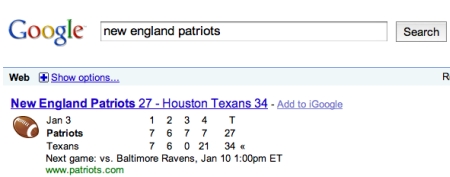Happy New Year, everyone! What better time is there than New Years to set resolutions and make predictions about what’s to come? For a blog post this week, I thought I would make some predictions about the future of online marketing and how it may change over the next five to ten years. It will be an exciting time, to be sure, but will also present a unique set of challenges. Here are my predictions, along with some advice as it is applicable.
Online Marketing Will Become More Like, Well, Marketing.
Perhaps the biggest trend in SEO over the last decade was to make it continually harder for people to “cheat” or “game” the system. Google’s emphasis over the past ten years was to deliver the best content for a given query, not the best-optimized content. This trend will continue in the years to come, to the point where Google simply cannot be fooled.
What does this mean? It means that to get to the first page of search results, you’ll have to earn it by delivering quality content, driving traffic to your site, and building a following. Marketing 1.0 just may be the key to success on the Web 3.0
The Major Players on the Web Will Become Even More Established.
Sites like Google, Amazon, eBay, Facebook, and Wikipedia aren’t going anywhere. In fact, they’ll become only more established in the years to come, as they continue to receive massive traffic and gain brand loyalty.
In many cases, up-and-comers will have to take an “if you can’t beat ’em, join ’em” approach, and work with these established players. This may mean opening an Amazon store, or building a Facebook application. It will definitely mean optimizing your site for the Google search engine. Even Wikipedia presents unique opportunities, as this great article from WordStream can attest.
The Search Engine Will Provide Much More to the User.
Google doesn’t just return search results anymore. They are continually trying to return information that the user might be interested in. This might mean maps, business reviews, weather data, or sports results. For example, here’s the search result page (SERP) for “New England Patriots”:

No need to go any further if you’re looking for the score, or the team’s next scheduled game. But Google isn’t the only one trying this. Bing refers to itself as a “decision engine,” attempting to provide all sorts of valuable info to the searcher. This trend will continue in the search engines of the next decade. More and more often, users will stop at the search engine result, finding what they need before clicking through to your site.
To get a better idea of what’s to come, try out a Google prototype called Google Squared. You’ll find that it’s pulling a large amount of content from each of the websites in the results, and displaying it in one matrix. In this model, it will become even more critical to format your content in a way that is easy for Google to process and scrape. If users can’t find what they’re looking for in the results page, they may not bother clicking through to your site.
Web Applications Will Become More and More Popular, at the Expense of Traditional Web Browsers.
Today, many organizations are reaping the benefits of the “mobile app” craze. As people become more accustomed to using these apps on their mobile devices, I believe this trend will extend to the desktop/laptop world (in fact, the line between mobile device and laptop is likely to become blurry). The result will be more time spent using the Web within the context of a specific application, and less time spent in traditional browsers like Firefox or IE. My advice on this one? Start building applications or risk getting left behind. A website, though a necessity, is no longer enough.
One Final Note
I’ve already used the word “Google” nine times in this post. Pay close attention to Google. It doesn’t take psychic ability to know that they may have the single biggest influence on the course of the Internet in the decade to come.


